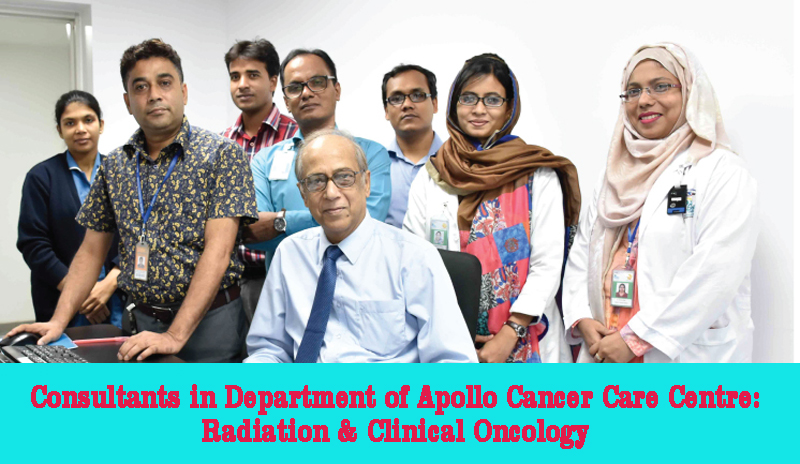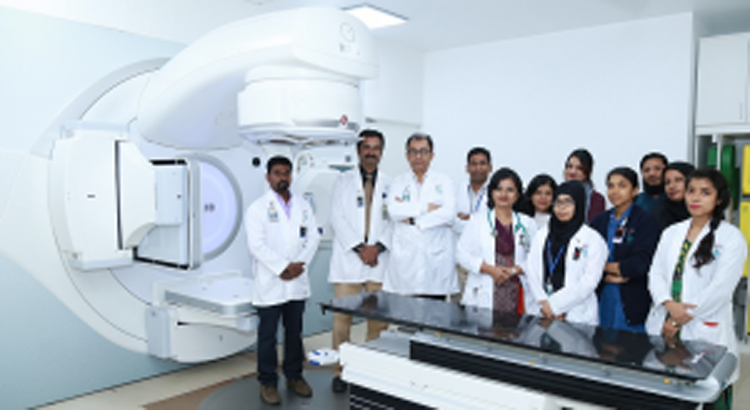The department provides consultation services in Basement level in the hospital through highly qualified and experienced Consultants, who carefully evaluate each patient. After diagnosing the patient’s condition, our Consultants discuss available treatment options and recommend the most effective treatment.
Department of Cancer Centre in Apollo Hospital
The division of Apollo Cancer Care Centre provides consultations by Consultants- Radiation & Clinical Oncologist, Medical Oncologist, Surgical Oncologist, The Rutherford Cancer Centres operate a network of cancer centres, nationally and internationally, providing all-encompassing cancer services for patients.

Consultation & Appointments
The department provides consultation services in Basement level in the hospital through highly qualified and experienced Consultants, who carefully evaluate each patient. After diagnosing the patient’s condition, our Consultants discuss available treatment options and recommend the most effective treatment.
Consultants in Department of Apollo Cancer Care Centre: Radiation & Clinical Oncology
Prof. Dr. Raju Titus Chacko
Qualification: MBBS, MD
Specialist: Senior Consultant – Medical Oncology
Schedule: Days: Saturday to Thursday Time: 09:00 AM - 5:00 PM
Chamber: Apollo Hospitals Dhaka,
Phone Number: +88-02-55037242 & +88-09606-276555
Dr. Jojo. V. Joseph
MBBS, MS (Surgery)
MCh (Surgical Oncology)
Senior Consultant – Surgical Oncology
Schedule: Days: Saturday to Thursday & Time: 09:00 AM - 5:00 PM
Chamber: Apollo Hospitals Dhaka,
Phone Number: +88-02-55037242 & +88-09606-276555
Dr. Ferdous Shahriar Sayed
MBBS, MD (Radiotherapy)
Consultant – Medical Oncology
Schedule: Days: Saturday to Thursday & Time: 09:00 AM - 5:00 PM
Chamber: Apollo Hospitals Dhaka,
Phone Number: +88-02-55037242 & +88-09606-276555
Prof. Dr. Narendra Kumar
MBBS, MD, MAMS
Consultant – Radiation oncology
Schedule: Days: Saturday to Thursday & Time: 09:00 AM - 5:00 PM
Chamber: Apollo Hospitals Dhaka,.
Phone Number: +88-02-55037242 & +88-09606-276555
Dr. Biswajit Bhattacharjee
MBBS, M. Phil (Radiotherapy)
Consultant – Radiation and clinical Oncology
Schedule: Days: Saturday to Thursday & Time: 09:00 AM - 5:00 PM
Chamber: Apollo Hospitals Dhaka,
Phone Number: +88-02-55037242 & +88-09606-276555
Prof. (Dr.) Md. Moarraf Hossen
MBBS, DMRT, FCPS (Radiotherapy)
Consultant – Oncology
Schedule: Days: Saturday to Thursday & Time: 09:00 AM - 5:00 PM
Chamber: Apollo Hospitals Dhaka,
Phone Number: +88-02-55037242 & +88-09606-276555
Out-patient Department Reception
Apollo Cancer Care Centre
PABX: 02-8431661-5, EXT: 1011
Ms. Rezwana Rashid Antora
Executive – Operations
PABX: 02-8431661-5, EXT: 1011
Our consultation services are multi-disciplinary and sub-specialty based that includes:
- General oncology
- Breast Cancer
- Lung Cancer
- Colorectal Cancer
- Hepatobiliary & Pancreatic Cancer
- Head and Neck Cancer
- Esophageal Cancer
- Neurological Cancers
- Urological Cancers
- Cancer & Prevention
Cancer is a type of disease characterized by the abnormal growth of cells. Your body consists of trillions of cells that serve a diverse range of functions. These cells all follow an orderly code in their genes that govern their behavior. When a cell’s genetic code is altered or damaged, it can behave in an unpredictable manner, such as failing to perform its intended functions and growing abnormally. When this happens, the cell can multiply until it forms a mass called a tumor. Tumors are generally classified as benign or malignant. When it demonstrates limited growth and does not spread to other parts of the body, it may be considered benign. Such tumors may not be considered cancerous and are generally less dangerous. Malignant tumors occur when cancer cells spread to other parts of the body in a process called metastasis. When this happens, the cancer cells invade and destroy normal cells in your body. This can have disastrous consequences on your health, and if left untreated, can cause your quality of life to rapidly deteriorate. There are more than 100 different types of cancer, and some cancers, such as leukaemia, do not form tumors.

Cancer is not contagious like flu or a common cold. You cannot get cancer from someone who has it. Since it is a result of cell mutation, can cancer be prevented? It is recommended that by leading a healthy lifestyle and avoiding certain risk factors, you can lower your risk of developing cancer.
Examples:
- Do not smoke — some studies have linked tobacco smoking with cancer
- Avoid consuming processed or preserved foods regularly. These include ham, bacon, luncheon meat and salted fish or pickled vegetables
- Stay active and exercise regularly
- Avoid high-heat cooking methods such as barbequing and roasting, as carcinogens may form in your food at very high temperatures
- Avoid excessive exposure to the sun as ultraviolet rays have been linked to greater risk for skin cancer
- Wear protective equipment and comply with safety regulations if you work near cancer-causing substances, such as industrial chemicals
Most Common Cancers
Breast Cancer
Symptoms of Breast Cancer
The symptoms of breast cancer may include any of the following:
- A painless lump in the breast
- Bleeding or unusual discharge from the nipple
- Dimpled or puckered skin over the breast
- Persistent itch and rash around the nipple
- Pulled in or retracted nipple
- Swollen and thickened skin over the breast
- Detection of Breast Cancer
- Breast Self-examination
Breast cancer is one of the few cancers that can be detected by the patient at home through self-examination. The patient should become familiar with the shape, form and feel of her breasts so as to recognise any changes, such as lumps. Regular self-examination can help to detect breast cancer early before it spreads, which usually accounts for more successful treatment. Some things to note regarding self-examination include:
Breast self-examination should be done monthly, preferably about a week after the last menstrual period starts.
If the patient no longer has menses, she should perform breast self-examination on the same day of each month, for example the first of every month.
During self-examination, the patient should look out for:
A lump, swelling, or thickening in the breast or underarm area Changes in the size or shape of one breast Puckering or dimpling of the skin of the breast or nipple
Persistent rash or change in the skin around the nipple Recent changes in the nipple, eg. inversion, retraction Any bleeding or unusual discharge from the nipple
Skin redness or soreness of the breast Accentuated veins on the surface of the breast
Unusual swelling of one upper arm Any enlarged lymph nodes in the armpit and collarbone areas Look for visible changes in the breasts and nipples by turning them slowly from side to side and feel for changes in the breasts, underarm, and collarbone areas. If you notice a lump in your breast, or if you suspect that you may have breast cancer, it is advisable to consult a doctor and undergo in-depth tests such as a mammogram.
Mammogram
A mammogram is a screening procedure that uses a special machine to take x-ray pictures of the breast. The x-ray pictures make it possible to detect cancerous tumours that cannot be felt by hand, or lumps in the breast that are not yet cancerous but may grow into cancerous tumours. The mammogram is currently one of the most reliable screening tools for breast cancer. Regular mammograms can help detect breast cancer early, thus allowing for early treatment. It is recommended for women between 40 – 49 years old to take annual mammograms.
MRI Breast
A breast MRI (magnetic resonance imaging) is a special screening procedure that takes images of the breast using strong magnetic fields and radio waves. A breast MRI is not a replacement for a mammogram. It is used as a supplemental tool to mammograms, usually when there is an abnormality on the mammogram that cannot be conclusively determined as a cancerous lump.
A breast MRI can be used to provide the doctor with detailed information on the position of the cancer as it creates images of the breast tissue. It is also used to check the site after treatment to determine if the cancer still remains.
In some cases, a breast MRI is used to screen for breast cancer in women who are at high risk of breast cancer, such as those who have a family history of breast cancer or younger women due to higher breast tissue density.
Breast Cancer Treatment
- Mammogram machine for breast cancer detection
- Depending on the stages of breast cancer, you may be recommended to undergo an operation to remove the tumour. This may be:
Breast conserving surgery:
- Lumpectomy — removal of the cancer and some of the surrounding tissue
- Quadrantectomy — removal of ¼ of the breast that contains the lump and surrounding tissue
- Mastectomy — removal of the whole breastOther treatments include:
- Drug therapy to destroy the cancer cells
- Chemotherapy
- Hormonal therapy
- Targeted therapy
- Radiation therapy (high-energy x-rays) to destroy the cancer cells
- Rehabilitation
- Nutrition and lifestyle support to help you recover
- Shoulder exercises and arm care to avoid stiffness and swelling
- Cervical Cancer
- Symptoms of Cervical Cancer
Infographic of cervical cancer stages and effects on cervix Early cervical cancer may have no symptoms. You should see a doctor if you have any of the following symptoms:
Abnormal bleeding or discharge from the vagina (after sexual intercourse or between menstrual periods)
Pain during sexual intercourse
Lower back pain or pelvic pain
Late stages symptoms include problems urinating, defecating, or leg swelling
Detection of Cervical Cancer
Equipment to collect Pap smear tissue samples
You should have regular screening of your cervix if you are sexually active — every 3 years until the age of 30, then every 5 years after if tests are normal. Cervical cancer is highly preventable and curable when detected and treated early through regular screening. The Pap smear test is the best screening tool available for the early detection of cervical cancer.
The Pap smear test is a method of cervical screening used to detect potentially pre-cancerous and cancerous cells in the cervix. It can be performed by a gynaecologist, and usually takes only a few minutes. During a Pap smear, the doctor will use an instrument known as a speculum to hold the walls of the vagina open so that the doctor can see the cervix clearly. A soft brush or spatula is then used to collect sample cells of your cervix. These cells will then be sent to a laboratory where the cells are tested for cancerous or pre-cancerous properties.
Women should avoid having sexual intercourse for 24 hours before the test, and they should not have the test performed when they are menstruating.
Cervical Cancer Treatment
Treatment depends on the stage of cervical cancer:
- Pre-cancer stage of the cervix is treated by removing the abnormal cells from the lining of the cervix through local ablative or excision procedures — this usually help prevents cervical cancer from occurring
- Early cervical cancer is treated by removal of the uterus (hysterectomy) or radiation therapy (high-energy x-rays), often with chemotherapy
- Late (advanced) cervical cancer is treated by radiation therapy, often with concurrent chemotherapy
- Colorectal Cancer
- Colorectal cancer is the top cancer affecting men and the 2nd most common cancer affecting women in Singapore. You should screen for colorectal cancer if you are above 50 years old. Find out more about the symptoms of colorectal cancer, and how it can be detected and treated.
Symptoms of Colorectal Cancer
Infographic colon cancer stages in colonoscopy Check with a doctor if you have these symptoms of colorectal cancer:
- Change in bowel habits (diarrhoea or constipation)
- Feeling nauseous or vomiting
- Feeling that your bowel does not empty completely
- Feeling very tired all the time
- Finding blood (either bright red or very dark) in your stools
- Finding your stools are narrower than usual
- Frequently having gas pains or cramps, or feeling full or bloated
- Losing weight with no known reason
- Detection of Colorectal Cancer
Colorectal polyps and cancers can be detected by the presence of blood that bleed into the colon. The amount of bleeding can be virtually invisible to the naked eye. The faecal immunochemical test (FIT) is a preliminary test that detects the presence of small amounts of blood in faeces. This test is available in a simple kit that can be carried out in the comfort of your own home.
Colonoscopy is one of the most common screening procedures for the detection of colorectal cancer. A flexible lighted scope is inserted through the anus to allow the doctor to see the internal walls of the rectum and colon. During this procedure, tissue samples can be collected for further testing, and existing polyps can be removed before they turn cancerous.
As polyps can take 10 to 15 years before they turn cancerous, studies have recommended that men and women above the age of 50 undergo a colonoscopy once every 10 years, or when symptoms occur.
Colorectal Cancer Treatment
- The most common treatment for colorectal cancer is surgery to remove the tumour. Surgery to remove colorectal cancer can take either the form of:
- Minimally invasive surgery, done by laparoscopy (keyhole surgery); or Open surgery to remove the cancer and some of the nearby colon tissues and lymph nodes (glands) whenever necessaryOther treatments that may be given before or after surgery include:
- Chemotherapy to destroy cancer cells
- Radiation therapy (high-energy x-rays) in designated area
- Targeted therapy to destroy or block the growth of cancer cells
Lung Cancer
Lung cancer is the top cause of cancer death for men and the 2nd most common cause of cancer death for women in Singapore. People who are above 40 years old, are a tobacco smoker, or have family members that have lung cancer have the highest risk of getting lung cancer. Find out more about the symptoms of lung cancer, and how it can be detected and treated.
Symptoms of Lung Cancer
Early lung cancer often does not cause symptoms. As the cancer grows, you may experience the following symptoms:
- A cough that gets worse or does not go away
- Breathing difficulty such as being short of breath
- Constant chest pain
- Coughing up blood
- A hoarse voice
- Feeling very tired all the time
- Frequent lung infections, such as pneumonia
- Weight loss without a cause
- Other health problems can also cause these symptoms, but you should see your doctor if you experience these symptoms.
- Detecting Lung Cancer
- Anatomy of colorectal system with cancerous tumour
How is Lung Cancer Detected?
Early detection of lung cancer can be achieved through imaging tests such as chest x-rays during routine health screening, which can reveal abnormal masses or nodules. For patients who are at-risk, or showing symptoms, an additional computerised tomography (CT) scan can reveal small lesions that may not be shown on an x-ray.
Nodules and masses found on x-ray and CT scans may not necessarily be cancerous. When abnormal masses or nodules are found during imaging tests, a bronchoscopy may be used for a more accurate diagnosis. This is a test where a special flexible lighted tube is inserted down the throat into the lungs to allow the doctor to see the nodules up close. The same tube can also be used to perform a biopsy and remove a sample of the tissue cells for laboratory testing.
Lung Cancer Treatment
There are 4 main treatments for lung cancer:
- Surgery to remove the tumour and some lymph nodes (glands)
- Chemotherapy to shrink or kill the cancer
- Radiation therapy (high-energy x-rays) to kill the cancer cells
- Targeted therapy to block the growth and spread of cancer cells
CHEMOTHERAPY SERVICES
Apollo Chemotherapy Day Care Unit is located in OPD level-3 & OPD Level-6 of the hospital.
The Day Care Unit is a unique wing of Apollo Hospitals Dhaka to help patients with specific need-based treatment in an out-patient basis. Patients in Day Care are those who undergo procedures not requiring overnight nursing care or stay in the hospital. Patients can have the procedure and then rest and be monitored in Day Care Unit for a few hours after the procedure. Afterwards, they can return home that same day. The hospital has four Day Care Units, all of which provide proper monitoring and care by staff nurse and Consultants who are in touch at all times about patient’s condition. All beds in Day Care Unit are equipped with life supports. Tariff for availing Day Care Unit facility (maximum 6 hours stay) is Tk. 400 per hour..
Apollo Chemotherapy Day Care Unit is dedicated to providing chemotherapy services for the management of cancer patients. Medical oncologists at Apollo often utilize chemotherapy, which uses systemic treatment in the form of intravenous injections of anticancer drugs or, less commonly, oral medications to kill cancer cells. Chemotherapy has the ability to reach cancer that may have spread, even microscopically, throughout the body. Chemotherapy sometimes involves biologic therapies, including antibodies and tumor growth inhibitors. Both traditional and innovative therapies are used. Each drug or combination is unique, and the type best suited to the patient and his/her disease will be selected.
Chemotherapy is usually given in cycles – a treatment period followed by a recovery period. Each cycle is usually several weeks long. Drugs are given on selected days, often weekly or monthly. Patients are usually given additional drugs to prevent possible side effects, which may include nausea, vomiting or allergic reactions. To ensure patient safety, blood counts are checked frequently to adjust the dose or intervals between therapy. Most patients receive therapy in an outpatient setting. Patients sit in a comfortable chair in pleasant surroundings and are able to read, sleep, watch TV or talk with friends and family during treatment.


You must be logged in to post a comment.